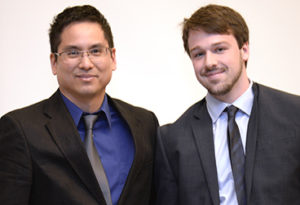
Dr. Bruno Takahashi and Jack Nissen
Reporting crises, such as the current COVID-19 pandemic, presents multiple challenges to journalists, such as the prevalence of misinformation, a faster pace of reporting and the potential threat to their own well-being and those they care about. The latter could result in physical and emotional harm, which could in turn affect their journalistic performance.
Knight Center Research Director Dr. Bruno Takahashi published a new study that examines local news reporting about the Flint water crisis. It applies a framework grounded in environmental justice research and community attachment to determine the ways journalists do their work when they perceive their communities are threatened and discriminated against. The article was co-authored with Ellis Adams, an assistant professor in the Department of Geosciences at Georgia State University, and Jack Nissen, a digital content creator at WJBK Fox 2 Detroit and graduate of the journalism MA program at Michigan State University.
The article, “The Flint water crisis: local reporting, community attachment, and environmental justice,” appeared in the journal Local Environment and was based on in-depth interviews with reporters in and around Flint. The study found that some reporters struggled to separate their personal experiences from their professional practices, but in general maintained their journalistic integrity in the midst of the crisis. These reporters were empathic toward impacted residents, which made them skeptical of official sources, which motivated further in-depth reporting.
